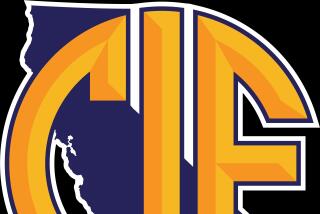College Dream Can Be High School Nightmare : Moonlighting: Some coaches worry that good officials will leave them for the college game. Others lament that these referees bring the college game to the high schools.
- Share via
SAN DIEGO — Area high school basketball players aren’t the only ones hoping to make the jump to the college level. So are high school referees.
But they haven’t just been hoping--they’ve been doing it. In fact, so many have been making that move lately that the talent pool in the City Assn. has evaporated, City and Metro Conference coaches say.
In a recent survey intended to rate high school referees, two coaches refused to list who they thought were the top overall officials.
The reason? The coaches worry that they will abandon high school games for college.
One City Harbor Coach who refused said, “Once they get better and know they are, they do less and less games and begin doing colleges.”
There are two main reasons for the migration.
No. 1 is money.
Doing a high school doubleheader (girls followed by boys) pays $73, a lot of money, financially strapped high school coaches point out.
But referees argue to the contrary. They counter that a single women’s community college game pays $49, a community college men’s game pays $55. A Division III women’s game pays $60, a Division III men’s game $70, a Division I women’s game $160 and a Division I men’s game at least $225.
The other reason to go college is ego. Everyone knows college assignments are reserved for the best officials. Like any other professional, they strive to reach the top of their field.
High school coaches are getting frustrated with the trend--and not just because they’re getting the younger, inexperienced referees at their games.
Bill Peterson, coach at Kearny High, recently recognized a referee who had been skipping high school assignments and taking college jobs. Peterson decided to make his job a little easier.
“We’re going to call ourselves the Hoyas,” Peterson told the official. “You’ve done so many college games, I thought you’d know who the Hoyas were, not the Komets.”
Peterson has one major gripe with referees who work games at both levels.
“They bring the college game into the high school gym,” he said. “Not much is called around the basket, it’s a much more physical game and the little guys suffer. And if you don’t get to the free throw line, you’re going to get beat.”
Jim Thompson of Madison says he has noticed the same thing.
“When you work college games as an official, you let more go,” he said. “You let them play more.”
There is another criticism. One City Central coach, who asked for anonymity, said referees who work college games and then come back down to the high school level sometimes dog it.
“Some of the guys who work a lot of college games I don’t like to see doing high school because they don’t think they have to work as hard,” the coach said.
Referees contacted denied this is the case, saying they try to take the attitude that each game is as important as the last, no matter what level it is at.
Perhaps the biggest detriment, one coach said, comes in the playoffs, when many referees who stick to the colleges during the season come down to the high school level.
“I think the guys who do the playoffs should have more experience with high school games,” the coach said. “But they do college and then have enough games to qualify (for the playoffs). They’re good officials, but the calls are different than the kids have seen all year.”
Again, referees counter this, saying a guideline is issued before the playoffs to ensure uniformity.
How many high school level referees do college games? All 35 referees mentioned as Best Overall in the survey do. And two, Tom Wood and Casey Basalo, don’t even take high school assignments any more.
More to Read
Get our high school sports newsletter
Prep Rally is devoted to the SoCal high school sports experience, bringing you scores, stories and a behind-the-scenes look at what makes prep sports so popular.
You may occasionally receive promotional content from the Los Angeles Times.






